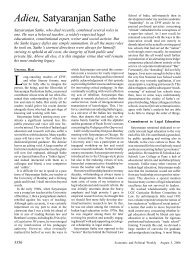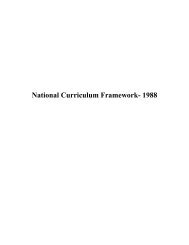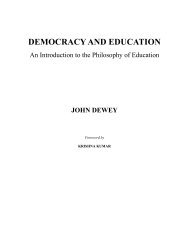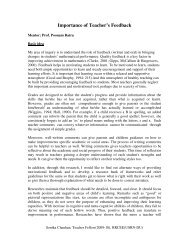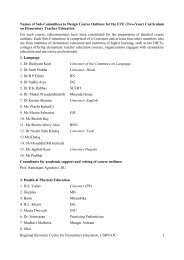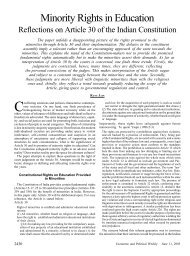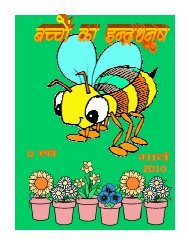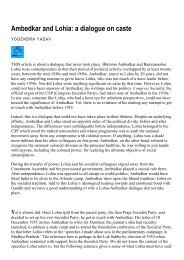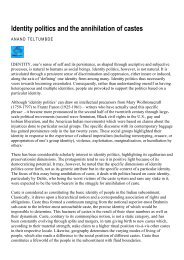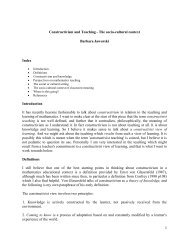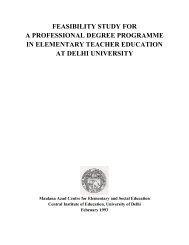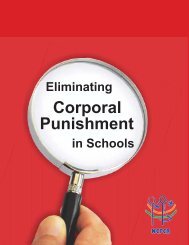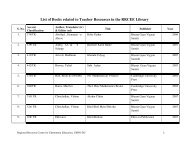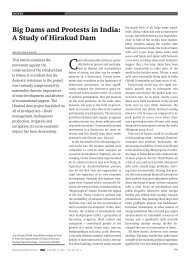Norms and standards B.El. Ed - Eledu.net
Norms and standards B.El. Ed - Eledu.net
Norms and standards B.El. Ed - Eledu.net
- No tags were found...
Create successful ePaper yourself
Turn your PDF publications into a flip-book with our unique Google optimized e-Paper software.
(i) The minimum qualification for admission to the B.EI.<strong>Ed</strong>. shall be a pass in the10+2 Senior Secondary Examination or any other examination recognised asequivalent thereto with a minimum aggregate of 50% marks.(ii) C<strong>and</strong>idate seeking admission to this programme must have completed the ageof 17 years on or before the commencement of admission as per UniversityCalendar.3. Intake <strong>and</strong> Migrationa) The intake of c<strong>and</strong>idates in one unit shall not exceed 35 in a class.b) The institutions may permit migration of students from one institution to another onlyonce at the end of 1st year subject to the number of students not exceeding the permittedmaximum intake with prior permission of the NCTE.4. Course <strong>and</strong> Periods of StudyThe institutions seeking recognition shall impart instructions in courses of <strong>El</strong>ementaryTeacher <strong>Ed</strong>ucation. As an integral part of the teaching programme, each institution shallarrange for field tours <strong>and</strong> visits to centres of innovative activity in elementary schooleducation. The institutions imparting instructions shall follow the Scheme of coursesgiven below:a) Scheme of Courses for the Bachelor of <strong>El</strong>ementary <strong>Ed</strong>ucation (B.EI.<strong>Ed</strong>.)The B.EI.<strong>Ed</strong>. programme should be designed to integrate the study of subjectknowledge, human development, pedagogy <strong>and</strong> communication skills. The programmeshould offer both compulsory <strong>and</strong> optional theory courses; compulsory practicumcourses <strong>and</strong> a compulsory comprehensive school internship experience. Theory <strong>and</strong>Practicum courses should essentially cover the following:Theory CoursesPracticum- Foundation Courses- Core Courses- Pedagogy Courses- Liberal Courses- Other options in <strong>Ed</strong>ucation- Performing <strong>and</strong> Fine Arts, Crafts <strong>and</strong> Physical <strong>Ed</strong>ucation- Participatory Work- Observing Children- Self Development Workshop- School Contact Programme- School InternshipNCTE, <strong>Norms</strong> <strong>and</strong> St<strong>and</strong>ards for Bachelor’s of <strong>El</strong>ementary <strong>Ed</strong>ucation (B.<strong>El</strong>.<strong>Ed</strong>) 3
- Project Work- Tutorials <strong>and</strong> Colloquia- Academic Enrichment Activitiesb) The theory <strong>and</strong> practicum courses may be classified in terms of knowledge areas assuggested in Table 1a <strong>and</strong> 1b.Table 1(a): Foundational Basis for Professional <strong>Ed</strong>ucationArea of StudySubjectKnowledge BaseB.<strong>El</strong>.<strong>Ed</strong>. CourseCore Courses :C1.1 Nature of LanguageC1.2 Core MathematicsC1.3 Core Natural ScienceC1.4 Core Social ScienceTwo-level liberal discipline specific optional courses :O2.X <strong>and</strong> O3.X in any one chosen discipline.Foundation Course (multi-disciplinary) :F1.2 Contemporary India.<strong>Ed</strong>ucation Foundation Courses :F3.6 Basic Concepts in <strong>Ed</strong>ucationF3.7 School Planning <strong>and</strong> ManagementF4.8 Curriculum StudiesF4.9 Gender <strong>and</strong> SchoolingChild Study Foundation Courses :F1.1 Child DevelopmentF2.3 Cognition <strong>and</strong> LearningF2.4 Language AcquisitionNCTE, <strong>Norms</strong> <strong>and</strong> St<strong>and</strong>ards for Bachelor’s of <strong>El</strong>ementary <strong>Ed</strong>ucation (B.<strong>El</strong>.<strong>Ed</strong>) 4
Table 1 (b): Applied Courses in Professional TrainingArea of StudyB.<strong>El</strong>.<strong>Ed</strong>. CoursesChild Study Practicum courses :PR1.2 (a) School Contact Programme(b) CraftPR2.3 Observing ChildrenP2.1 Language Across the CurriculumP3.2 Logico-Mathematics <strong>Ed</strong>ucationP 3.3 Pedagogy of Environmental StudiesOne of the Optional PedagogyCourses : OP4.1LanguageOP4.2 MathematicsOP4.3 Natural SciencesOP4.4 Social SciencesOROne of the Optional Liberal Courses Related to<strong>Ed</strong>ucation :OL4.1 Computer <strong>Ed</strong>ucationOL4.2 Special <strong>Ed</strong>ucationSchool Contact Programme : SC 3.1 ClassroomManagement SC 3.2 Material Development <strong>and</strong>EvaluationDevelopment ofTeachers <strong>and</strong>Skill TrainingSchoolExperienceFoundation Course :F2.5 Human Relations <strong>and</strong> CommunicationPracticum Courses :PR1.1 TheatrePR1.2 CraftPR2.4 Self-developmentPR2.5 Physical <strong>Ed</strong>ucation Colloquia / TutorialsAcademic EnrichmentField- based projects / assignmentsSI School Internship ProjectNote: Suggestive/illustrative details are given in Annexure A.NCTE, <strong>Norms</strong> <strong>and</strong> St<strong>and</strong>ards for Bachelor’s of <strong>El</strong>ementary <strong>Ed</strong>ucation (B.<strong>El</strong>.<strong>Ed</strong>) 5
c) Student Contact HoursThe minimum student contact hours year-wise may be as indicated in Table 2.Table 2: Year Wise Minimum Student Contact HoursYear of StudyStudent ContactHours per dayStudent ContactHours per weekTotal No. ofContact HoursI 6.7 33.5 837.5II 5.3 26.5 662.5III 5.4 27.0 675.0IV 5.8 29.0 725.0Total 23.2 116.0 2900.0Students Contact Hours to be read as contact periods. A period is usually of 50min. duration. Average Student Contact Hours computed at 5 working days perweek.Total No. of Contact Hours computed for 25 working weeks in a year.5. The Conduct of the B.EI.<strong>Ed</strong>. ProgrammeThe institutions will have to meet the following specific dem<strong>and</strong>s of a professionalprogramme of study:a) Integrate the B.EI.<strong>Ed</strong>. students with other institutions’ academic as well as cocurricular,<strong>and</strong> for the use of all basic facilities such as computers, playground, library,auditorium, etc.b) Promote inter-disciplinary academic activities between various departments within theinstitutionsc) Initiate discourse on education by organizing seminars, lectures <strong>and</strong> discussion groupsfor students <strong>and</strong> faculty.d) Professional assistance must be sought from within <strong>and</strong> outside theUniversity/Institutions conducting specific of the programme (eg : theatre, craft, selfdevelopmentworkshops).e) The institution must initiate <strong>and</strong> sustain interaction with a cluster of at least sixelementary schools. These schools shall form basic contact point for all practicumactivities <strong>and</strong> related work throughout the programme of study.f) The institution must initiate placement services for the graduates in schools.NCTE, <strong>Norms</strong> <strong>and</strong> St<strong>and</strong>ards for Bachelor’s of <strong>El</strong>ementary <strong>Ed</strong>ucation (B.<strong>El</strong>.<strong>Ed</strong>) 6
6. Examination, St<strong>and</strong>ards <strong>and</strong> Qualification of ExaminersThe following shall be integrated into the appropriate Ordinances of theUniversity/Institution concerned which will make provisions through its StatutoryBodies for review as <strong>and</strong> when appropriate <strong>and</strong> in consultation with the NCTE.a) The University shall conduct the examination at the end of each year.b) Practicum courses may be assessed internally.c) A Moderation Board constituted by the concerned University/Institution shall monitorissues of quality <strong>and</strong> parity between Institutions for all Practicum Courses <strong>and</strong> theInternship Programme.d) The weightage of internal assessment for all theory courses may be 30% <strong>and</strong> for allpracticum courses 100%.e) The minimum marks required to pass the examination may be 40% in each writtenpaper, 45% in the internal assessment, 50% in Practicum <strong>and</strong> 50% in the aggregatefor each year.f) Only those c<strong>and</strong>idates who have passed in the internal assessment shall be permittedto appear in the examination.g) Any c<strong>and</strong>idate who has obtained not less than 50% in aggregate but has failed in onesubject only, obtaining not less than 25% in that subject may be provisionally allowedto proceed to the next year on the condition that she/he will appear for a compartmentexamination to be held on payment of fees as per University rules. If the c<strong>and</strong>idatefails to pass or fails to present herself/himself at the compartment examination she/hewill be reverted to the previous year.h) An examiner for any of the subjects of examination shall have a minimum of 3 yearsteaching/professional experience in his/her field of study,7. Staff, Equipment <strong>and</strong> Traininga) Academic Faculty- Full -Time Faculty Strength : 14- Faculty -Student Ratio : 1: 10- Number of Students : 35 X 4 = 140- Part-Time Faculty Strength : 3b) The institutions shall encourage the faculty members to involve in professional practiceincluding research.c) The institutions shall encourage exchange of faculty members for academic programme.d) Administrative Staff- Curriculum Laboratory attendant : 1- Resource Laboratory attendant : 1- Steno typist : 2e) Nature of employment of staffNCTE, <strong>Norms</strong> <strong>and</strong> St<strong>and</strong>ards for Bachelor’s of <strong>El</strong>ementary <strong>Ed</strong>ucation (B.<strong>El</strong>.<strong>Ed</strong>) 7
All staff should be appointed on full time <strong>and</strong> regular basis. Properly constitutedSelection Committee will select the c<strong>and</strong>idates for all positions. The salary structure ofteaching staff should be as per UGC / Govt. <strong>Norms</strong>.f) Selection of FacultyFaculty of the Department of <strong>El</strong>ementary Teacher <strong>Ed</strong>ucation shall have diversespecialisation (as indicated in Table 3) alongwith a postgraduate professional degree ineducation* or a research degree in education* or demonstrated experience / research inthe field of education*.*Preferably elementary education.Table 3: Profiles of Faculty Required for the Department of <strong>El</strong>ementary <strong>Ed</strong>ucationSpecialisationNo. ofPostsEssential QualificationSpecialinterest <strong>and</strong>DemonstratedExperienceSuggestedB.<strong>El</strong>.<strong>Ed</strong>.Course to beTaught1 2 3 4 5Psychology/ChildDevelopmentOneplusM.A.Psychology/AppliedPsychology (withspecialisation in ChildDevelopment)/M.Sc.Child Development <strong>and</strong>Research Degree in<strong>Ed</strong>ucationWork withchildren/Issues of howchildren learn,workundertakenwith childrenChildDevelopmentCognition <strong>and</strong>LearningRelatedPracticumOneM.A.Psychology/AppliedPsychology (withspecialisation in ClinicalPsychology/Counselling)/MSW (withspecialisation inPersonalityDevelopment <strong>and</strong>Counselling) <strong>and</strong> P.G.Degree/ Research in<strong>Ed</strong>ucationClinicalpsychology/CounsellingHuman/Relations <strong>and</strong>CommunicationsRelatedPracticum* Preferably elementary education.NCTE, <strong>Norms</strong> <strong>and</strong> St<strong>and</strong>ards for Bachelor’s of <strong>El</strong>ementary <strong>Ed</strong>ucation (B.<strong>El</strong>.<strong>Ed</strong>) 8
Mathematics One M.A. Maths/M.Sc.Maths <strong>and</strong> Post-graduateprofessional degree in<strong>Ed</strong>ucationCreativeteachingmethodsCoreMathematicsLogico- Math<strong>Ed</strong>ucationSchool ContactPedagogy ofMathsScienceBiologicalSciences <strong>and</strong>PhysicalSciencesOneplusM.Sc. BiologicalSciences <strong>and</strong> PostgraduateProfessionaldegree in <strong>Ed</strong>ucationPsychology oflearning,curricularissues, scienceteachingCore NaturalSciencePedagogy ofEnvironmentalStudiesOneM.Sc. Physical Sciences<strong>and</strong> Post-graduateprofessional degree in<strong>Ed</strong>ucation- do -School ContactPedagogy ofNatural ScienceSocial ScienceOneplusM.A. Political Science(with specialisation inDevelopmentalStudies/PoliticalEconomy/ M.A.Sociology (withspecialisation inDevelopmentalStudies/Political <strong>and</strong>Economic systems)/MA.History (withspecialisation inPhilosophy of SocialSciences <strong>and</strong> P.G.Degree/Research in<strong>Ed</strong>ucationIntegratedapplications ofsocialsciences,environmentaleducation,multidisciplinaryperspectivesoncontemporaryIndian issuesCore SocialScienceContemporaryIndiaM.A. Social Sciences<strong>and</strong> a Post-graduateprofessional degree inPedagogicstudies insocialPedagogy ofEnvironmentalStudiesNCTE, <strong>Norms</strong> <strong>and</strong> St<strong>and</strong>ards for Bachelor’s of <strong>El</strong>ementary <strong>Ed</strong>ucation (B.<strong>El</strong>.<strong>Ed</strong>) 9
One <strong>Ed</strong>ucation. sciences,creativeteachingmethodsPedagogy ofSocial ScienceLinguistics One M.A. Linguistics/M.A.English/hindi withDiploma in Linguistics<strong>and</strong> Research inlanguage development inchildren/P.G. degree in<strong>Ed</strong>ucation/Research in<strong>Ed</strong>ucation.Languagedevelopmentin children,creativelanguageteaching.Nature ofLanguageLanguageAcquisitionLanguage :Hindi orEnglishOneM.A. English/ Hindi <strong>and</strong>a Post-graduateprofessional degree in<strong>Ed</strong>ucation.Developmentof curriculamaterials;teachinglanguagethroughinnovativemethods;languagepedagogyLanguageAcross theCurriculumRelatedPracticumPedagogy ofLanguage<strong>Ed</strong>ucationOneplusOneM.A. Philosophy <strong>and</strong>Post graduate degree in<strong>Ed</strong>ucation/ProfessionalDegree in <strong>Ed</strong>ucationM.A. SocialScience/M.Sc. Science<strong>and</strong> PG ProfessionalDegree in <strong>Ed</strong>ucation<strong>Ed</strong>ucationaltheory,philosophy<strong>and</strong> PolicyCurriculumissues,Practitionersperspective ofschooleducation.Basic Conceptsin <strong>Ed</strong>ucationChildDevelopmentCurriculumStudiesCurriculumStudiesRelevant units ofother coursesSchool Planning<strong>and</strong>ManagementLiberal Three * Post-graduate degree in Inter- Liberal OptionalNCTE, <strong>Norms</strong> <strong>and</strong> St<strong>and</strong>ards for Bachelor’s of <strong>El</strong>ementary <strong>Ed</strong>ucation (B.<strong>El</strong>.<strong>Ed</strong>) 10
Optional(at least 4)the relevant subject.disciplinaryperspectivesofferedPart-timeFaculty :TheatreCraftSelfDevelopmentPhysical<strong>Ed</strong>ucationThree**Training <strong>and</strong>Demonstratedexperience in therelevant field :Theatre in <strong>Ed</strong>ucationCraft making/trainingClinical/CounsellingPractice/Training ingroupsTraining <strong>and</strong> Practice inPhysical <strong>Ed</strong>ucationCapacity touse theatre forselfdevelopment<strong>and</strong> in<strong>Ed</strong>ucationSkill in craftmaking <strong>and</strong>Capacity totrain othersAbility toconductworkshops inpersonalgrowth /counsellingPerforming <strong>and</strong>Fine ArtsCraft,ParticipatoryworkSelfDevelopmentWorkshopsPhysical<strong>Ed</strong>ucationCapacity tointegratevarying formsof physicalmovementwith education* These would be from cooperating departments of an Institution** Equivalent of one full-time faculty (these would be specialised resourcepersonnel from outside the Institution)8. Other FacilitiesThe institutions shall provide facilities as follows:Physical FacilitiesThe physical facilities to be provided in an institution offering the B.EI.<strong>Ed</strong>. can beclassified under (i) Academic area, (ii) Administrative area, <strong>and</strong> (iii) Amenities area.NCTE, <strong>Norms</strong> <strong>and</strong> St<strong>and</strong>ards for Bachelor’s of <strong>El</strong>ementary <strong>Ed</strong>ucation (B.<strong>El</strong>.<strong>Ed</strong>) 11
- Academic area will consist of Class Rooms, Curriculum Laboratory, ResourceLaboratory, Conference Room, Workshop, Auditorium, Computer Room <strong>and</strong> Library.- Administrative area will include Principals’ Room, Faculty Rooms, Central Office,Conference Room, Record Room, Computer Room <strong>and</strong> Reception Lounge.- Amenities area will comprise Students’ Common Room, Staff Room, Hall,Sports/Recreation Centres, Canteen, Cooperative Stores, Dispensary <strong>and</strong> SecurityServices.9. <strong>Norms</strong> for SpaceWhere teacher education is provided through a Department/College as an integral part ofa University/Institution having several Faculties <strong>and</strong> Departments of Studies, all Centralfacilities/amenities are to be shared between the Department of <strong>El</strong>ementary <strong>Ed</strong>ucation<strong>and</strong> other Departments. In the case of laboratories <strong>and</strong> workshops, necessary additionalprovisions need be made so that the B.EI.<strong>Ed</strong>. students can make use of them. Apart fromthe Central Library of the University/College, a Departmental Library may also bedeveloped to cater to the special needs of the B.EI.<strong>Ed</strong>. students. The Resource Laboratoryshould be equipped with adequate reading material alongwith other equipment needed forPedagogy-based practicum <strong>and</strong> other School Contact Programmes. Amenities such asAuditorium, Hall, Conference Rooms, etc. could be shared with other departments.10. Specific Insfrastructural Facilities for Students of B.EI.<strong>Ed</strong>.a) Curriculum Laboratory : OneThe curriculum laboratory shall be the lab. area for conducting h<strong>and</strong>s-on experienceactivity. The laboratory would serve this purpose for first year courses such as craft, coremathematics, core science <strong>and</strong> partly for core social science <strong>and</strong> for third year courses inlogico-mathematics education, pedagogy of environmental studies <strong>and</strong> practicum onmaterial development.The lab. would contain science <strong>and</strong> mathematics related material such as apparatus,chemicals, kits, maps, globes, instruments <strong>and</strong> tools like hammer, pliers, scissors <strong>and</strong>wires. There should be work tables for small group activities. The furniture should bemovable to allow for work area on the floor as well. The lab should also have provisionfor use of an overhead projector, notice boards <strong>and</strong> blackboard for holding classes.b) Resources Laboratory : OneThe resources lab shall serve the purpose of a laboratory-cum-departmental library. Itshould have a store <strong>and</strong> access to books, curriculum materials, children’s literature,textbooks, reports <strong>and</strong> documents. These materials are essentially for use for the B.EI.<strong>Ed</strong>.courses of study. Materials should be available in sufficient numbers for use by studentsin schools as well. The Resource Laboratory may also have computer facility for use bythe faculty <strong>and</strong> students. The laboratory should have sufficient space for studentmeetings, classes <strong>and</strong> group discussions <strong>and</strong> reading as well.c) Workshop Space : TwoThe institution should provide separate space for conducting specific practicum activitiessuch as theatre workshops, self-development workshops <strong>and</strong> physical educationNCTE, <strong>Norms</strong> <strong>and</strong> St<strong>and</strong>ards for Bachelor’s of <strong>El</strong>ementary <strong>Ed</strong>ucation (B.<strong>El</strong>.<strong>Ed</strong>) 12
workshops. Such space should allow for free physical movement for a batch of 35-40students.11. Fee Structure <strong>and</strong> ScholarshipEssentialThe fee structure should be as decided by the State Govt./University from time to time. Inany case, the total fees <strong>and</strong> other charges collected from students should not exceed theper pupil recurring expenditure of the institution.DesirableAdequate free studentships may be provided for meritorious poor students. Provision forsome scholarships on the basis of merit may also be made.Nature of Employment of StaffAll staff should be appointed on full time <strong>and</strong> regular basis. Properly constitutedSelection Committee will select the c<strong>and</strong>idates for all positions. The salary structure ofteaching staff should be as per UGC/Govt. <strong>Norms</strong>.NCTE, <strong>Norms</strong> <strong>and</strong> St<strong>and</strong>ards for Bachelor’s of <strong>El</strong>ementary <strong>Ed</strong>ucation (B.<strong>El</strong>.<strong>Ed</strong>) 13
SCHEME FOR FOUR YEAR BACHELOR OF ELEMENTARYEDUCATION PROGRAMME (B.<strong>El</strong>.<strong>Ed</strong>.)Annexure AStudents will be admitted to this Programme after +2Theory Practium Colloquia/ProjectEncrichmentExaminationDurationTotalMarksContactHours perweekTotalMarksContacthours perweekTotalMarksContacthours perweek1 2 3 4 5 6 7 8 9 10 11 12Year IF1.1 ChildDevelopmentF1.2Contemporary IndiaC1.1Nature ofLanguageC1.2 CoreMathematicsC1.3 CoreNaturalScience3 1003 1002 502 502 50C1.4 Core 2 50PR 1.1performating & FineArtPR 1.2Craft,ParticipatoryWork4 753 25ColloquiaTutorial1 50AcademicEncrichmentActivities1Gr<strong>and</strong>TotalNCTE, <strong>Norms</strong> <strong>and</strong> St<strong>and</strong>ards for Bachelor’s of <strong>El</strong>ementary <strong>Ed</strong>ucation (B.<strong>El</strong>.<strong>Ed</strong>) 14
SocialSciencesYear IIF2.3Cognition&LearningF2.4LanguageAcquisitionF2.5HumanRelations&CommunicationP2.1LanguageAcross theCurriculumLiberalCourse(Optional-I)02.1English I02.2 HindiI02.3 MathsI02.4 Phy. I02.5Chem. I3 1002 502 502 503 100400 7 100 1 50 1 550PR2.3ObservingChildrenPR 2.4SelfDevelopmentworkshopsPR 2.5Physical<strong>Ed</strong>ucation2 753 502 25ColloquiaTutorial1 50AcademicEncrichmentActivities1NCTE, <strong>Norms</strong> <strong>and</strong> St<strong>and</strong>ards for Bachelor’s of <strong>El</strong>ementary <strong>Ed</strong>ucation (B.<strong>El</strong>.<strong>Ed</strong>) 15
02.6 Bio. I02.7 Hist. I02.8 Pol.Sc. I02.9 Geog.I02.10 Eco.I350 7 150 1 50 550F: Foundation Course; C: Core Course: P: Pedagogy Courese; O: Optional Liberal Course; OP:Optional Pedagogy Course; OL: Optional Courses; PR: Practium; SC: School ContactProgramme; SI: School Intership.In the course nomeclature, the numeral immediately following letters (F, C, P etc.) denotes theyear of the programme in which the course is to be taught. The second numeral denotes theserial number in a particular course type. For instance, F2-5 signifies that Human Relations <strong>and</strong>Communication is the 5th Foundation Course to be taught in the 2nd year of the Programme ofstudy.NCTE, <strong>Norms</strong> <strong>and</strong> St<strong>and</strong>ards for Bachelor’s of <strong>El</strong>ementary <strong>Ed</strong>ucation (B.<strong>El</strong>.<strong>Ed</strong>) 16



